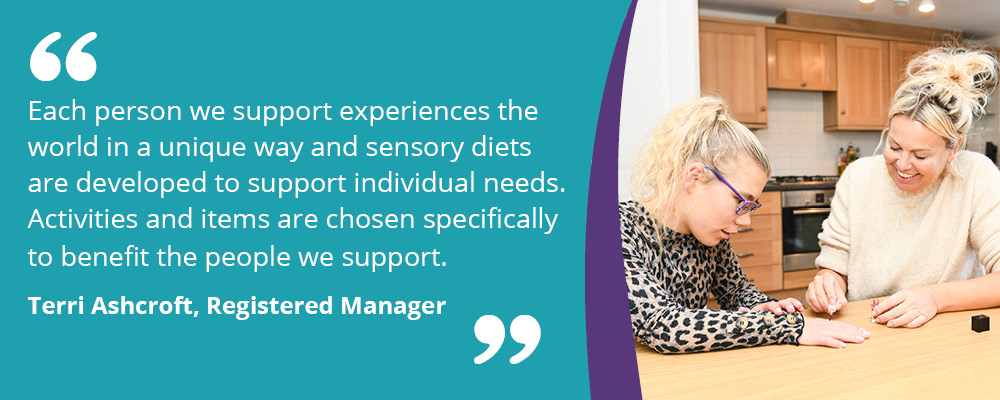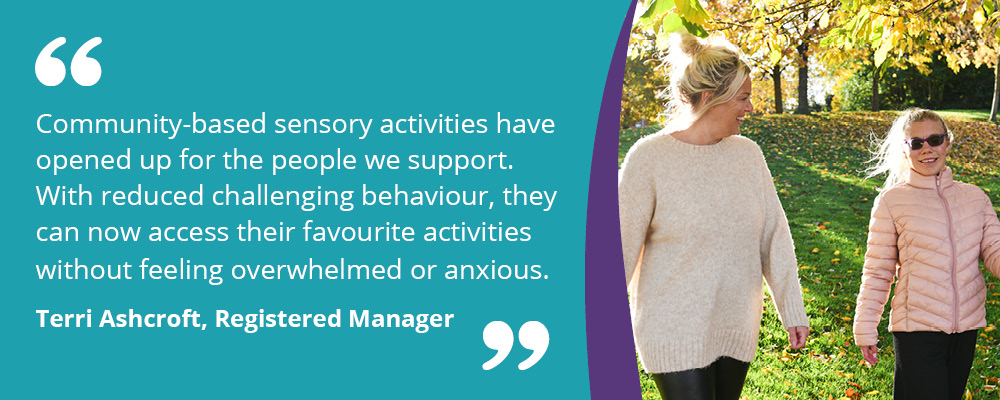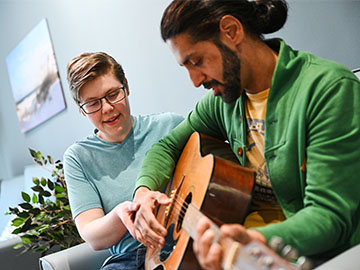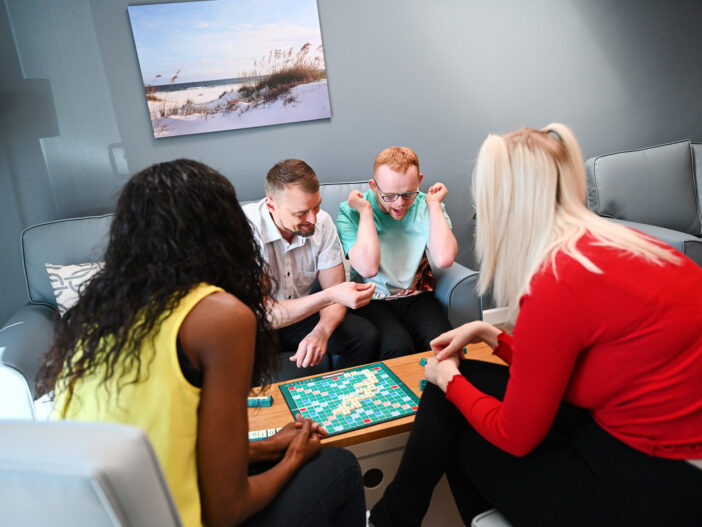Promoting wellbeing with sensory diets at Durlands Road!
At Durlands Road our specialist autism team recognises each person we support is unique. Tailoring support to meet their individual needs is an important part of our approach, empowering them to live happy lives!
Collaborating with community-based disability professionals, Durlands Road have introduced bespoke ‘sensory diets’ to the people we support.
Much like a sensory profile, each person receives individualised plans of sensory activities that support them in a variety of situations. From reducing feelings of anxiety, challenging behaviours, and even improving mobility, the people we support are experiencing amazing benefits from their sensory diets!
What is a sensory diet?
A sensory diet maps out sensory activities beneficial to people with autism. Certain sensations can support issues like physical discomfort, complex emotions, and changes to routine.
Each diet specifies key sensations that support particular problems, along with a list of activities and techniques that influence these feelings.
Many of the people we support with autism have additional needs. From OCD and ADHD to complex emotional needs, each person has their own experience of the world around them. Our team introduced various sensory activities and items to support the unique needs of the people who live at Durlands Road.
Sensory diets were first introduced for two people we support at Durlands Road. One gentleman had transferred from another service provider and needed a balanced sensory input to manage his emotions.
To support him, our team introduced activities to use up excess energy and encourage focus when his emotions were high. This helped balance his hyperactivity and support him to feel calmer. When he felt low, they encouraged him to do the activities they knew brought him joy, such as singing and playing musical instruments.

Developing the diet
We use a variety of techniques to deliver the right sensory experiences to each person. By getting to know them individually and identifying their likes and dislikes, our team can match items and activities to their needs.
Some people we support benefit from music sessions when they are feeling low, so a variety of instruments are available around the house. Most people enjoy getting together for a group jam session!
Other individuals enjoy water, so our team might encourage them to have a bath when they need to feel calmer. But different types of baths have different effects. A bath of just water might calm someone down, but adding bubble bath might make them excitable. We’ve taken our time to identify these differences and used them to achieve a balanced approach.
In some cases, it’s been trial and error – particularly when it comes to the sense of touch. Some people like certain textures but might seek out these textures in an unsafe way. We’ve collaborated with them to find suitable alternatives that fulfil the sensation they need.
One member of the household enjoys smoother textures and took a shine to certain creatures in our garden! The team knew this was unsafe and introduced them to making their own Play-Doh and slime. It satisfied their need for a smooth surface but in a fun, safe way.
Another person we support responds well to crunchy textures, and likes to cook, so the team worked with them to make Rice Krispy cakes. This elevates their mood, and they get a tasty treat at the end!
A sensory haven
We have a wealth of sensory items around the house. They’ve been chosen based on what the people we support need and are widely accessible – they’re part of everyday life!
Our garden features a section of artificial grass that was built for a housemate who likes the feel of it.
We also have a water table, so individuals can plunge in their hands and splash the water around. Items like jugs are available, so individuals can move the water in different ways. Watching the water brings a sense of calm to many of the people we support.
The people we support are also encouraged to have sensory items in their bedrooms. It makes them more personal and gives them a place to retreat to. Glowing lights and lamps projecting shapes onto the ceiling are popular choices. They’re fun to watch and promote a sense of calm.
Everyone has their own preference for sound. We support individuals who like loud noises, and others that prefer a quiet environment. We recognise that responses to noise is part of self-expression. The people we support can retreat to different rooms when they might need to sing along loudly to their favourite song, or branch off for some quiet time. This way, everyone can express themselves without negatively impacting their housemates.
We’ve even created community-based sensory opportunities. The hydrotherapy pool is a favourite throughout the household and also offers valuable therapy to those with physical disabilities.
Before sensory diet plans were formally introduced, the people we support would only access the pool occasionally as they often presented challenging behaviours when out in the community.
Since starting their sensory diet plans, they’ve managed to reduce challenging behaviour and now go to the pool on a regular basis. It’s a big achievement for them!

The future is bright
Introducing sensory diets has been a slow process that will continue to progress. Each person has evolving needs and their regimes will continue to develop with them.
We’ve seen some incredible outcomes since introducing sensory diets to the people we support. As well as more balanced emotions and improvements in challenging behaviours, the people we support now recognise when they need sensory input and can self-regulate! Whether they feel too stimulated or a little low, accessing the right sensory equipment is becoming natural to them.
Sensory diets have also opened up more opportunities in the community. One member of the household loves walking, but their mobility issues prevented them from doing this activity. By using a sensory diet to reduce challenging behaviours, they can now access the community-based hydrotherapy pool, which has helped improve their mobility. Now they can get out and about as much as they like!
Going out on group excursions has also formed part of the success. Some of the people we support are triggered by crowds and noise and would present challenging behaviours outside the home.
Introducing a sensory diet has empowered our team to manage these triggers, and going out is now a positive experience! Our housemates love going to the Sealife centre and no longer feel anxious or overwhelmed.
Our biggest success story is one individual who is due to go on their first holiday! Taking this trip is a huge step and something that wasn’t achievable before their sensory diet was introduced. They used to present a lot of challenging behaviours and being away from home was a big trigger.
Now, with the support of our team, they’re empowered with confidence and can self-regulate their emotions. Accompanied by their support workers on the trip, they have opportunities to discover new sensory activities away from home. The first stop is the beach! They love being outdoors, so the sea and sand is the perfect new sensory experience for them.
Find out more about our specialist autism support
If you would like to learn more about our specialist autism services and how we can support you, a loved one or a client, complete our quick and easy form, and a member of our team will be in touch.

 Information
Information 

